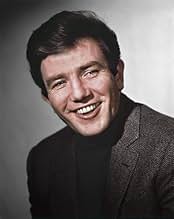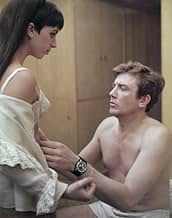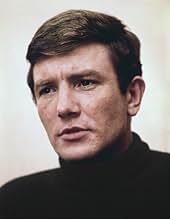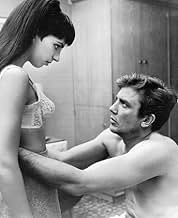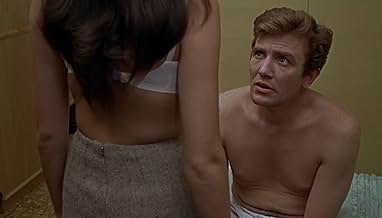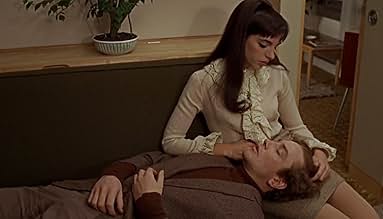AVALIAÇÃO DA IMDb
6,3/10
898
SUA AVALIAÇÃO
Adicionar um enredo no seu idiomaA married writer has an affair with his secretary.A married writer has an affair with his secretary.A married writer has an affair with his secretary.
- Ganhou 1 prêmio BAFTA
- 3 vitórias no total
Avaliações em destaque
A few unwelcome scatological moments of surreal humour not withstanding, Albert Finney's only film as a director, "Charlie Bubbles", remains both a remarkable period piece and one of the most imaginative British films of the sixties, perhaps not the masterpiece I first thought it to be, (it was my best film of the year), but unmissable nevertheless. Finney made it in 1968, from an original screenplay by Shelagh Delaney, a time when the Kitchen Sink was no longer fashionable and a new kind of New Wave, typified by films like Nicolas Roeg and Donald Cammell's "Performance" and Richard Lester's "Petulia", was coming into play. This is certainly good enough to make you wish Finney had directed again.
He plays a working-class writer who has made it big, (he drives a Rolls and his books have been turned into films), and the film is set over the weekend he drives North and back to his roots with his unofficial secretary in tow, (a very good, if unlikely, Liza Minnelli), to see his nine year old son, (a first-rate Timothy Garland), who lives on a farm with Charlie's ex-wife, (a terrific Billie Whitelaw). Not much happens and at times Delaney's screenplay is a little too Pinteresque for its own good, but it's also a richly observant picture of Britain at a particular moment in time and is greatly enhanced by the superb cinematography of Peter Suschitzky.
He plays a working-class writer who has made it big, (he drives a Rolls and his books have been turned into films), and the film is set over the weekend he drives North and back to his roots with his unofficial secretary in tow, (a very good, if unlikely, Liza Minnelli), to see his nine year old son, (a first-rate Timothy Garland), who lives on a farm with Charlie's ex-wife, (a terrific Billie Whitelaw). Not much happens and at times Delaney's screenplay is a little too Pinteresque for its own good, but it's also a richly observant picture of Britain at a particular moment in time and is greatly enhanced by the superb cinematography of Peter Suschitzky.
Interesting but ultimately unmoving drama (with quirks) has the title-named character, a rich writer who lives in plushy comfort, unable to get over his guilt of having money. When Charlie visits his Northern haunts, where the streets are filled with potholes and the surroundings match the sky--all in gray--we wonder, "Why is he so obsessed with his early poverty?" and "Why can't he get on with his life?" Director-star Albert Finney doesn't give us much to go on (or maybe you have to be British to understand the symbols inherent in British society) and most of his film feels like a put-on. Liza Minnelli has a small part as an American secretary, and she occasionally pushes her kooky "Americanisms" too far; however, though the role isn't much, Minnelli has a strange, slightly zonked/slightly exotic presence, and when she performs in a low-key she's appealing. As Mrs. Bubbles, Billie Whitelaw got most of the acclaim, but it's Liza we remember. As for the much-talked about finale, I thought it profound in its fantastic way, but, like the rest of "Charlie Bubbles", it exists to please and understand itself, leaving the rest of us on the outside looking in. ** from ****
I understand that there was a real problem getting this film a theatrical release and that it is more a mid-sixties film than a late 60s one, not being released in the UK until 1969. I can understand the reluctance of distributers. With the best will in the world and considering that this may have been a heart felt effort to produce a European style thought provoking drama, it is hard to see this as anything other than a misguided and pretentious, vanity project. It starts disastrously with a reunion with a working class chum (who over does it enormously) with whom because he is now rich and famous somehow cannot relate. Plus the unforgivable homoerotic messy food prank in the posh restaurant. Things go from bad to worse, I don't know whether Shelagh Delaney's script was scrapped or that this drivel really was hers, either way the only saving grace are those fantastic Lancashire city and landscape shots. The views of what I assume to be the Manchester ship canal an added bonus, as for the rest, no thanks. Oh and the miscasting of Liza Minnelli is inexplicable, she is dreadful.
"Charlie Bubbles" actually won Billie Whitelaw a Best Supporting Actress award from the New York Film Critics circle back in 1968, but it is mostly remembered today as Liza Minnelli's film debut. She's in it for about a third of the running time, and it's an assured comic performance, quite different from her later screen personas. Albert Finney's direction and performance are fresh and intriguing, and Whitelaw deserved her accolade--she walks off with the last third of the film. You'll either love or hate the ending.
Although the apparent unhappiness of Finney as a successfull, and rich writer might seem difficult to accept, think of all the things you thought of as beyond you as a kid. Some of the people reading these words are making a lot of money, live in a beautiful house, have a beautiful, handsome, wife, husband, and dread each new day. Some of it is good old chemical deppression, and some of it is, who the hell knows. That Finney, a working class kid, realized this at such a young age makes me respect him even more than my admiration for him as an actor. The film I feel looks back to the post WW2 Italian existential movies where very little happens. Life is almost slow motion wandering around. Witness Finney's pitiful relationship with his son and his complete lack of interest in his legal an financial affairs with his lawyers in the opening scene. The cast is wonderful. I'm sure the idea of Liza Minelli as his assistant was laughed at. Liza, playing with British pros? Are you kidding? But it works. Billie Whitelaw was born for the movies, and is incidentally Samuel Beckett's favorite actress. She has premiered many of his plays. That Julia Roberts is a superstar, and few people know who Billie Whitelaw is, says something about "something". As a personal aside, one of the great supporting character actors, the late Colin Blakely, who plays Finney's failed sidekick and I, met in front of a London theatre. I told him I came all the way from the US to tell him how wonderful I thought he was. "Did you see my show tonight", he asked. "No sir, I haven't had a chance yet", I replied. He quickly turned away, and walked in a different direction!!!!
Você sabia?
- CuriosidadesThis was a very personal project for Albert Finney, who made his debut as director with it and made it for his own company, Memorial Enterprises. He got fairly lavish backing from an American company, Universal, who were trying to set up a system for making films in England, but then had the greatest difficulty in getting the finished film shown. He made the film in 1966, but, although advance word on it was very positive, and the film eventually won awards as well as rave reviews, it was not shown in either the US or Britain until 1968; its American opening was well over six months in advance of its British one. Finney did his best to promote the film in several countries, but it was written off as a box-office failure. He hoped to direct in films again, and announced a film to be called "The Girl In Melanie Klein" in the early 1970s; but he never made it and never directed another theatrical feature.
- Erros de gravaçãoThe credits suggest that the place where Charlie and Eliza meet the airman is a cafe. It is not: places on the motorway where refreshments and fuel can be obtained are called motorway service stations in Britain.
- Citações
Charlie Bubbles: The back door was wide open. Anybody could have walked in instead of me. You might have got a sex maniac.
Lottie Bubbles: Not with my luck.
- ConexõesReferenced in Stella Street: Very Twisty Turny (2000)
Principais escolhas
Faça login para avaliar e ver a lista de recomendações personalizadas
- How long is Charlie Bubbles?Fornecido pela Alexa
Detalhes
- Data de lançamento
- País de origem
- Idioma
- Também conhecido como
- Charlie Bubbles
- Locações de filme
- Empresas de produção
- Consulte mais créditos da empresa na IMDbPro
- Tempo de duração1 hora 29 minutos
- Proporção
- 1.85 : 1
Contribua para esta página
Sugerir uma alteração ou adicionar conteúdo ausente

Principal brecha
What is the French language plot outline for Charlie Bubbles, a Máscara Sem Rosto (1968)?
Responda

